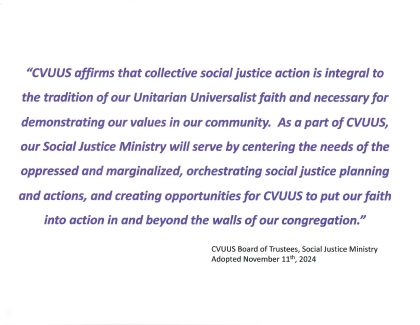Social Justice Ministry
“When we choose to love, we choose to move against fear–against alienation and separation. The choice to love is a choice to connect–to find ourselves in the other.”
bell hooks
 Is your spirit called to create a more equitable and just world for all? Contact Mary Hadley or Tom Morgan to learn more about CVUUS’s Social Justice Ministry.
Is your spirit called to create a more equitable and just world for all? Contact Mary Hadley or Tom Morgan to learn more about CVUUS’s Social Justice Ministry.
 We hope to shine our light with our Side with Love t-shirts which you can purchase during social hour after worship or by contacting Mary Hadley or Mike Greenwood.
We hope to shine our light with our Side with Love t-shirts which you can purchase during social hour after worship or by contacting Mary Hadley or Mike Greenwood.

